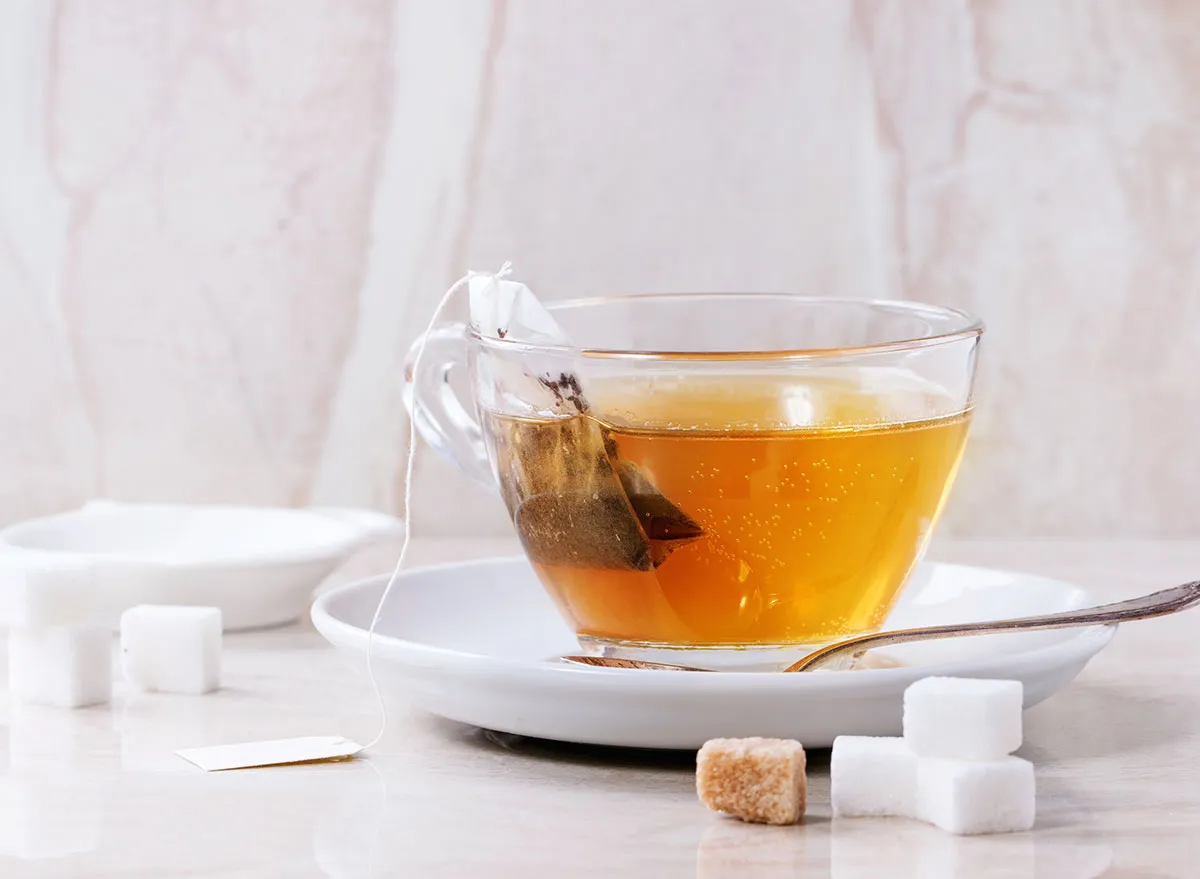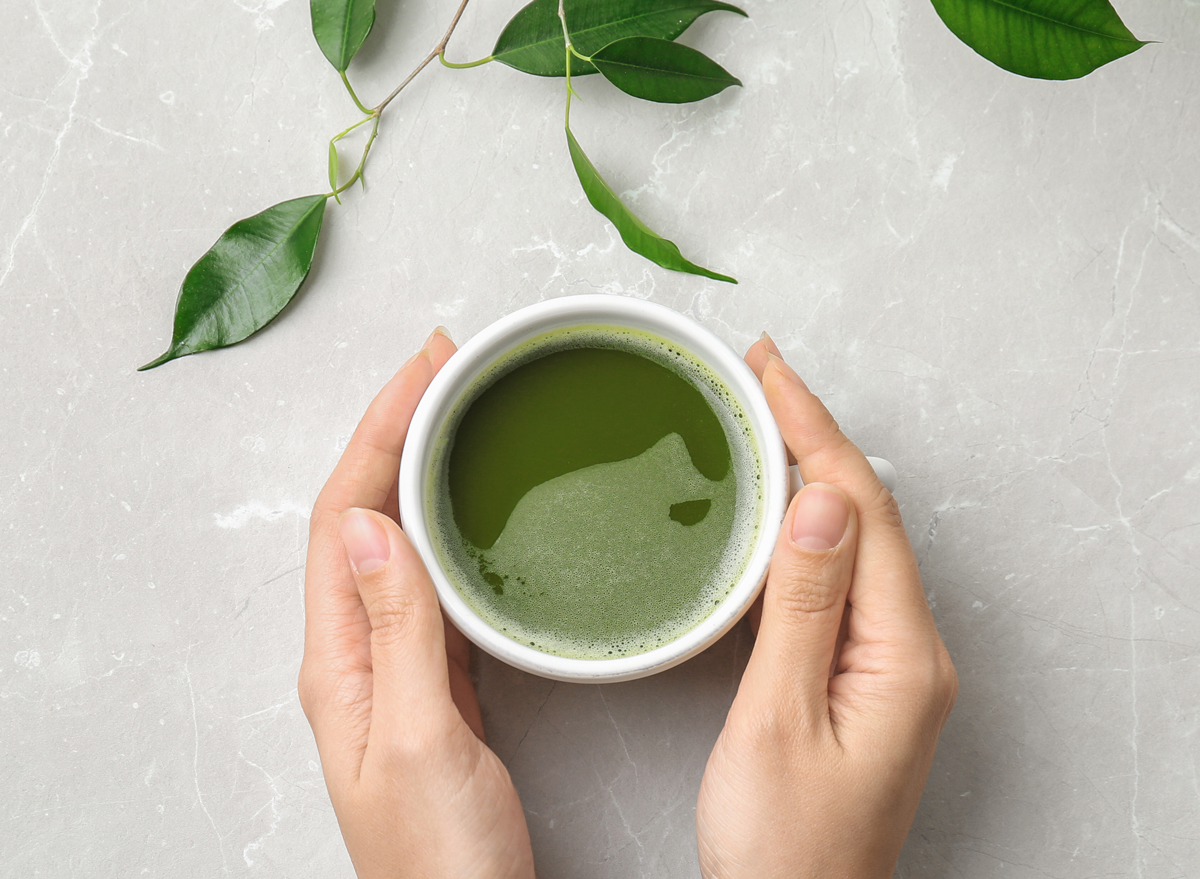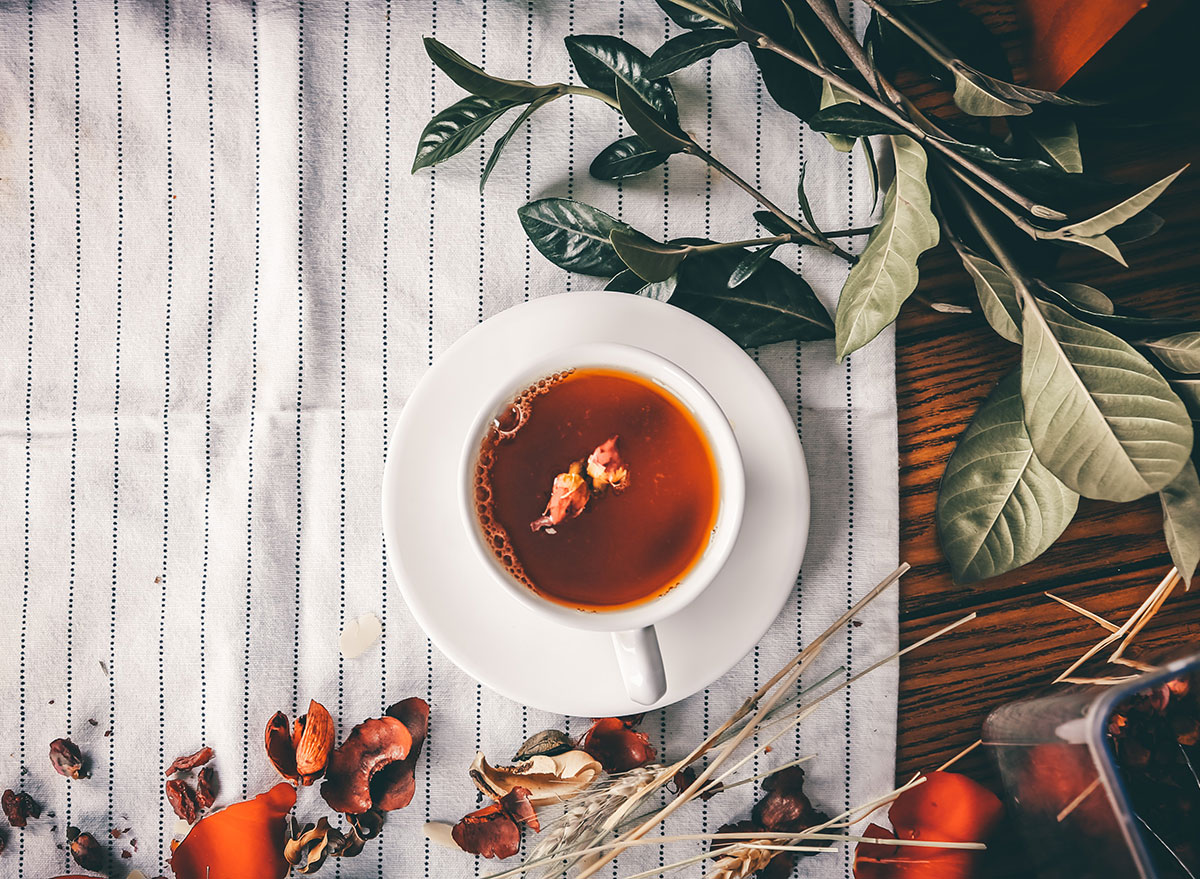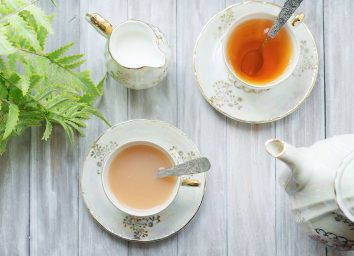Side Effects of Giving Up Tea, According to Nutritionists
If you're thinking about giving up caffeine, you'll need to remove coffee and many varieties of tea from your diet. But if you're a regular tea drinker, that may come with some side effects—not all of them good.
According to dietitians, the compounds in tea have enough of an effect on our bodies that we may experience a number of changes when we give it up. "While tea contains a lower caffeine content than coffee, it has enough to produce an effect, so it's best to cut back slowly," explains Dr. Lisa Young, RDN. "Tea is also a form of fluid so it is very important to be sure to drink more water. Tea drinkers may also just miss the ritual itself and having a glass of tea is a great way to end a meal."
Some dietitians, like Molly Kimball, RDN, believe that tea is beneficial enough to our health that they wouldn't recommend people give it up. "There are SO MANY health benefits to tea and so few drawbacks," says Molly. "I would so much rather people drink tea, versus what they're often drinking!"
There are plenty of ways to make the desired changes in your diet without cutting out tea altogether. For example, if you're trying to cut out caffeine, you could switch out the black, oolong, green, or white teas you usually drink for herbal varieties, like camomile or lavender. And if you think your tea with milk and sugar may be getting in the way of your weight loss goals, you could make the switch to drinking your tea black.
Read on to find out what side effects you can expect if you give up drinking tea. And don't miss The 7 Healthiest Foods to Eat Right Now.
You may experience caffeine withdrawal

Even though tea contains less caffeine than coffee, you may still experience some caffeine withdrawal if you cut tea out of your diet too quickly. "Caffeine can improve mental alertness, athletic performance, and even boost your mood, so if you take it out, it's likely you could experience headaches, fatigue, dizziness, and even light-headedness," says Amy Goodson, RDN.
And according to Megan Byrd, RDN, of the Oregon Dietitian, the symptoms of caffeine withdrawal will manifest within "the first few days," when you can "expect headaches and fatigue, especially if the tea you've been used to drinking is caffeinated."
Caffeine withdrawal symptoms won't be uniform for everyone who decides to give up drinking tea. "Note, it really depends how much tea you drink as well as what type of tea you drink," Goodson points out. "Black tea is typically the highest in caffeine, with oolong, green and white teas following. If you rely heavily on tea as your source of caffeine, you are likely to experience more negative effects when you take it out."
You may need to include more antioxidants in your diet

When you cut out tea, you may lose one of the beverage's most significant health benefits. "Tea, especially green tea, is known for its antioxidant content and so giving it up may decrease the antioxidants in your diet," explains Byrd. "However, that is nothing to worry about if your diet is balanced with plenty of fruits and vegetables."
Foods like blueberries, strawberries, raspberries, artichokes, and kale are rich in antioxidants, so you should incorporate more of those into your diet if you choose to give up drinking tea.
You may experience an increased risk of chronic disease

Unless you supplement your diet with other sources of antioxidants, cutting out tea may increase your risk of developing a number of health conditions. "The antioxidants found in tea may help reduce your risk of chronic diseases like heart disease, stroke, and maybe even cancer," says Goodson.
For example, according to the American Institute for Cancer Research, compounds in tea have the potential to protect against cancer "through antioxidant defenses and influences on cell growth," although more research needs to be done to confirm the link and to determine what kind and how much tea is most beneficial.
You may be more dehydrated

"Drinking tea is an easy way to meet your daily water needs since tea naturally has flavor to it," says Goodson. Consequently, when you cut out tea, you may need to make sure you're drinking more water to meet your daily water needs, or risk becoming dehydrated. The more tea you're used to drinking, the more water you'll need to drink to maintain your daily water intake.
You may lose weight

If you typically drink your tea with milk and sugar, cutting tea out of your diet may result in weight loss, as long as you don't turn to other sources of sugar to fill the gap.
"If you aren't going to be swapping in another sugary beverage in place of your tea, then you can assume you will probably lose some weight," says Byrd. "However, that really depends on how much sugar and milk you were using in your tea, and how many teas you were drinking every day. The more drastic the change, the more significant the results will be!"
You may experience sugar cravings

If you're used to drinking sweetened tea, cutting back may help you lose weight, yes, but you may also have to deal with sugar cravings. "You may find yourself craving something sweet or something to drink other than water, so try not to substitute in sugary beverages to fuel those cravings," warns Byrd.
Some herbal teas may help prevent sugar cravings, so cutting them out may bring the cravings out in full force.
"Fruit-infused water or hot lemon water may be good options if you're experiencing those cravings," says Byrd.
You may feel more stressed

If you're cutting out all kinds of tea, you might lose some of the benefits offered by specific teas. "Green tea, for instance, contains the amino acid L-theanine, which has a calming effect, and can also work together with the tea's caffeine content to improve brain function," explains Dr. Young. "Tea like lavender and chamomile, which are caffeine-free, are very calming and soothing."
For more, check out the 108 Most Popular Sodas Ranked By How Toxic They Are.









